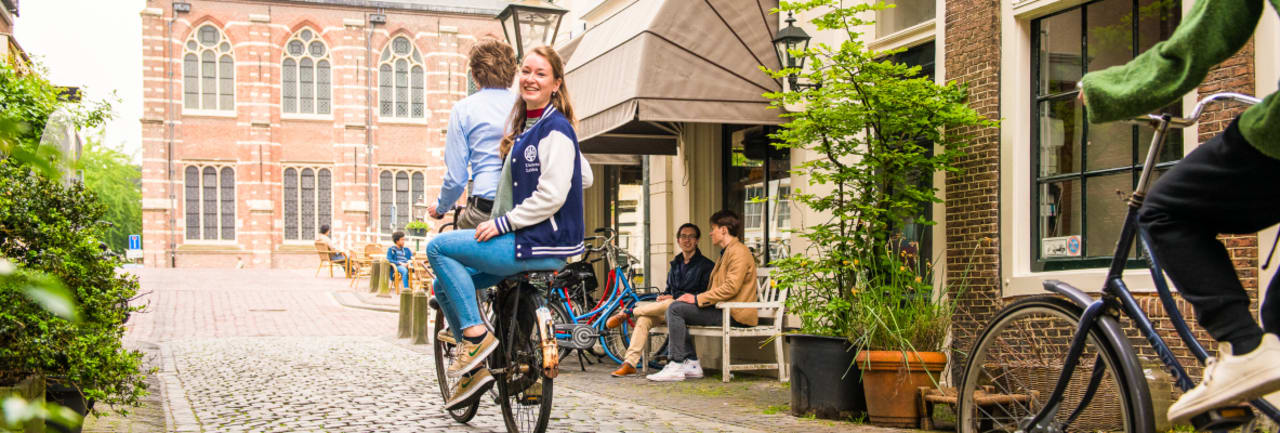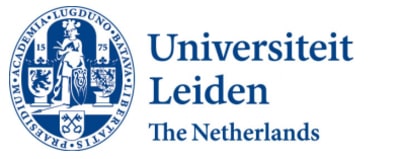
BA Arts, Media and Society
Leiden University

Key Information
Campus location
Leiden, Netherlands
Languages
English
Study format
On-Campus
Duration
3 years
Pace
Full time
Tuition fees
EUR 2,314 / per year *
Application deadline
01 May 2024
Earliest start date
Sep 2024
* First year bachelor students: the statutory tuition fee of the academic year 2023-2024 for first-year bachelor students is €1157.
Introduction
Visual art today is strongly interlinked with today’s society, a connection which is reinforced and deepened by social and other media. In Arts, Media and Society, a specialisation of our Art History bachelor's programme, you will explore this relationship and analyse how it reflects and impacts the issues of our time, while also learning practical and academic skills that are invaluable in the current job market.
About Arts, Media and Society
In Arts, Media and Society you will be able to study a wide range of contemporary visual art forms, including visual arts such as painting, video art and photography, installation art, bio-art, games, performance art and digital media art. Art does not exist in isolation, and therefore this programme encourages you to study and interpret art’s relationship to our society as well as the role of media in that relationship. This means that when studying visual art within Arts, Media and Society you will also touch upon issues of visual art relating to, for instance, science and politics.
Society
Most art is inspired by the society it is created in. Today we face multiple challenges, such as climate change and inequality, and many artists reflect on these issues in their work. Some artists take an outright activist role, making their voice heard in current debates. Others comment on societal developments and changes, while taking the role of an outsider.
Media
Today’s media, including social media, are an essential factor in the ongoing exchange between society and the arts. They bring not only artists and audience together, but also highlight new aspects of the major issues society is facing, which artists may use in the creation of a work of art.
An example is the art resulting from a Black Lives Matter protest in Bristol. In 2020 activists toppled a statue of a 17th century slave trader, throwing it in the harbour. When British artist Marc Quinn on Instagram saw a picture of activist Jen Reid standing on top of the empty plinth, he was inspired to create an installation depicting this activist. When the installation, Surge of Power, was illegally placed on the vacant plinth near the harbour, pictures of it were widely shared on Instagram. The artist, activists and social media not only all contributed to the creation of this work of art, but also jointly acted to give it new layers of meaning. During our programme, you will thoroughly explore such examples of the relationship between art, media and society.
What you will learn
As a student of Arts, Media and Society, you will not only learn how to look at modern art, how to interpret it, to think about it and to write and present your findings. You will also develop academic and practical skills that will prove essential for your further career, be it in academia, the public or the private sector.
Seven reasons to study Arts, Media and Society at Leiden University
- A programme with a broad scope in which you will study contemporary visual arts, the role of media and the way they interact with today’s society.
- Lecturers who belong to the top in their field and who base their teaching on their current research.
- Hands-on experience in research projects and field trips.
- Guest lectures by national and international artists, scholars and scientists, outside of the regular programme.
- Excellent facilities in the historic and diverse city of Leiden, with easy access to museums, art galleries and media institutions in Leiden and nearby cities such as The Hague, Amsterdam and Rotterdam
- Lively community of international students and lecturers.
- Perfect preparation for a career in academia, the public or private sector.
Is Arts, Media and Society the programme for you?
- Are you fascinated with contemporary art and do you want to understand how it is interconnected with the media we
- Are you interested in how contemporary artists engage with societal issues and challenges such as global warming, inequality and safety?
- Do you want to explore what the role is of art and media in current public debates?
- Do you thrive in an international environment?
- Do you want to have the opportunity to learn about artists’ and other art professionals’ views on the role of art in society?
- Are you looking for a challenging, innovative programme with a personal approach?
Admissions
Curriculum
What you will learn
This three-year, English-taught Arts, Media and Society programme is a specialisation of the Leiden University’s Art History programme, which means that the first-year introductory courses are jointly offered to Arts, Media and Society students and Art History students. In the second and third year, you will explore a wide variety of contemporary cultural manifestations, ranging from artist collectives and community art to 3d printing, games and protest art, all of which you will learn to place in an art-historical context. You will also gain in-depth knowledge of new developments in contemporary arts and media forms, as well as the cultural roles that the arts and media play in today’s society.
Learn academic and professional skills
You will also be taught academic and professional skills. These include a wide variety of competences such as academic writing, presentations, research, working in teams, communication. Many of those skills are highly sought after by employers and will be of use to you in your further career.
Year 1
How the World Makes Art
Art is universal for all human beings. People have expressed their dreams, hopes and fears in paintings, sculptures and drawings everywhere on earth and in every period in history. Art has always been used to influence its beholders: to impress them, to evoke feelings of love and admiration or to express social, political and religious values and identities. In this introductory course, we will look at art using four guiding themes: power, religion, identity and the afterlife.
Arts in Society
From ancient practices of performances, to art as a political and societal activist tool in the 21st century: art and society have always been interconnected. In this course, you will focus on the various interactions between art and politics, art and religion, and art and technology in ancient as well as in modern societies. This will be studied from the perspective of various themes, including the art market, feminism, memory, body, race and ecology.
Big Media
Television, games, the visual arts, literature and the Internet can be regarded as major forces in western contemporary society. In this course we will discuss the social and cultural implications of the introduction and advance of (new) media. As part of this course, you will research the changing context for these media, and how they influence our views on art, popular culture, power and aesthetics.
Year 2
Museums, Cultural Heritage and Collections
The central theme of this course is the collection, presentation, conservation and management of cultural heritage, both in the past and the present and in a national and international context. Among many other things, you will gain an appreciation of how and why collections are assembled and an insight into how they are made accessible to the public.
World Art Studies
In this course you will develop a sense of the visual arts across both space and time. You will also learn how to identify the key questions that should be asked when analysing art as a worldwide phenomenon. Moreover, you will learn to understand the similarities and cultural differences in the creation, use, and perception of art across the world.
AMS on Site, Curating the City
In this course, the urban environment will serve as both the site of our work and the object of our critical reflection. This course aims to anticipate the most pressing issues that are shaping (and will continue to shape) contemporary, globalised, curated cities. As part of a team of students, you will explore a subtheme that relates to 'Curating the City'. Your team will develop a framework and a research question that you will investigate in a (partly) out-of-the-classroom setting, from the multiple angels of art, media and society.
Year 3
Electives, internship and thesis
The third year offers you the flexibility to pursue your interests. You can either follow electives or a minor from another programme in Leiden, do an internship in the Netherlands or abroad, or study abroad at a university in our network. Our Career Services can support you in finding a position as an intern.
You will only have to take one seminar in this year. Depending on your interests and study planning, you can follow this course in the first or the second semester. To conclude the programme you will write a thesis, choosing your own topic on the basis of your chosen seminar’s theme.
Gallery
Ideal Students
Is this programme for you?
Ask yourself the following questions:
- Do you care about today’s pressing challenges and are you fascinated by the way that art and artists reflect and comment upon these issues – for example, the work of Ai Wei Wei?
- Do you believe that contemporary art can make a contribution to how we view the most pressing real-life issues?
Then the Bachelor in Arts, Media and Society is for you!
Career Opportunities
What is your preferred career path? Would you prefer a job that involves communication? Or do you want to work on research projects in a museum environment? Or would you like to continue in academia? You will find that your Arts, Media and Society degree is a perfect preparation for the career of your choice.
These skills will help you
After graduating from the Arts, Media and Society programme you will have acquired valuable skills that are sought after by employers looking for new staff and by universities selecting candidates for master’s programmes. These skills include:
- Working independently
- Critical thinking
- Writing
- Working in teams
- Project management
- Resourcefulness
- Self-reflection
Our job market survey shows that 79% of our graduates find a job within two months, and 53% find a job at an academic level immediately.
What will your professional field be?
Your degree in Arts, Media and Society means that you will be an attractive candidate for a variety of employers. For example, you could work in the cultural sector, business or education.